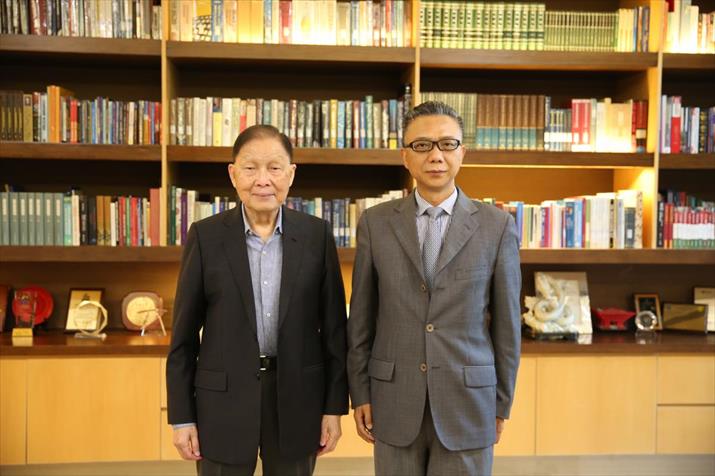| Ambassadors Say |
| Open for Business | |
| Advice for Sino-Indonesian economic links | |
|
|
 Chinese Ambassador to ASEAN Xu Bu (right) poses for a photo with Mochtar Riady, founder of Lippo Group (FILE)
Indonesia is one of the most important countries along the 21st-Century Maritime Silk Road proposed by Chinese President Xi Jinping. What are the opportunities and challenges for Chinese enterprises looking to invest in the largest Southeast Asian country? Xu Bu, China's Ambassador to the Association of Southeast Asian Nations (ASEAN), recently discussed this and other issues with Mochtar Riady, founder of the Lippo Group, one of Asia's largest and most diversified conglomerates and Indonesia's largest services provider. Edited excerpts follow: Xu Bu: Chinese enterprises are hoping to play a role in promoting the regional economic growth and integration of the ASEAN Economic Community. For instance, many of them are interested in investing in Indonesia—what advice would you give them? Mochtar Riady: The per-capita GDP in Indonesia had exceeded $3,000 in the 1980s, much higher than that of China's at the time. However, during the financial crisis in 1998, it dropped to $300. Now the country is facing a new period of growth. Chinese enterprises hoping to invest in Indonesia should first get to know about the country's economic environment, which is currently dominated by three main trends. Firstly, Indonesia is now embracing economic liberalization and opening. Regardless of the level of integration, the ASEAN is an economic community in the legal sense. This represents an impetus for furthering the economic liberalization and opening in Indonesia as well as the whole of Southeast Asia. Secondly, along with the economic development of Indonesia, a middle-income group is emerging in the country. Indonesia's middle class now accounts for a large portion of its population, which helps the country to transition to a service-led economy. At present, though Indonesia's manufacturing sector is lagging, its service industry is quite mature. Thirdly, Indonesia is entering the era of digital technology. The development and application of digital technology is the main feature of the fourth industrial revolution. In the context of globalization, digital technology will play a significant role in improving Indonesia's economy. What are the common obstacles encountered by foreign businesses when they invest in Indonesia? There are still many constraints affecting Indonesia's economic development. Jakarta is as developed as many other cities around the world, but places 100 km away from Jakarta are less developed, and places outside the Island of Java are even more underdeveloped. Also, business costs in Indonesia are relatively high. For instance, every year, Cikarang, the most concentrated industrial area of Indonesia, produces around 1 million automobiles and 10 million motorcycles, as well as other electrical appliances such as televisions. However, this industrial area which only covers an area of 200 square km is divided into six industrial parks instead of a comprehensive one, which results in much higher administrative costs. In the meantime, raw materials for automobile manufacturing need to be trucked from places 200 km away, which greatly increases costs. Electronic parts also have to be imported from other countries. Moreover, due to Jakarta's shallow wharf, all ships need to wait in line before unloading, resulting in further costs. In addition to the complicated procedures for cargo clearance in Indonesia that cause headaches, transporting the goods from docks to factories is another problem. Uncertainties are also increased due to the rocky import process. Therefore, companies have to store their production materials for one month to guarantee their production, which incurs even more costs. In addition, government intervention also results in high water, electricity and labor costs for business operations. All of these factors contribute to Indonesia's low competitiveness. What do you suggest to improve Indonesia's economic development? My suggestion is to learn from China. The reform and opening up policy, put forward by late Chinese leader Deng Xiaoping, has released a huge and astonishing amount of energy for China's rapid development. Shenzhen was a blank slate just next door to Hong Kong. It thus enjoyed a geographic advantage by developing supporting industries that met Hong Kong's demand. When the door was opened, capital flowed in quickly. China's opening up was actually conducted cautiously. After gaining success in Shenzhen, the policy was extended to other coastal cities in China, and later, gradually spread to the hinterland. I have told some Indonesian officials that China, as a country with more than 1 billion people, had a foreign reserve of far less than billion dollars in the 1990s. But now Shenzhen is totally different. So I think, the economic development of a big country can start from one point and then gradually fan out from that point to the whole country. Copyedited by Bryan Michael Galvan Comments to liuyunyun@bjreview.com |
|
||||||||||||||||||||||||||||||
|